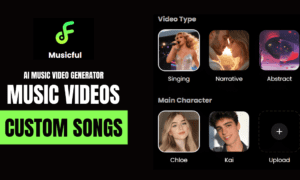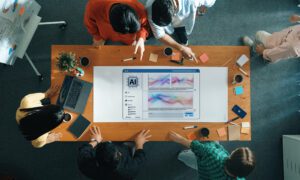Introduction
In an era where technology continually pushes the boundaries of creativity, the intersection of artificial intelligence (AI) and music has emerged as a transformative force. The AI music generator, a marvel of modern technology, is redefining how we create and experience music. Far from replacing human creativity, these tools serve as an extension of it, opening doors to new realms of musical expression that were once unimaginable. This article explores the multifaceted world of AI music generators, examining their mechanisms, impact, and potential for the future.
What Is AI Music Generator?
AI music generator is a software tool that uses artificial intelligence to compose music. By analyzing vast datasets of existing music, these generators learn patterns, styles, and structures, which they then use to create new compositions. These tools can mimic various genres and artists, generating anything from classical symphonies to modern pop tunes. AI music generators are not just random note generators; they create structured, cohesive pieces that can evoke emotion and tell a story, much like human-composed music. As these technologies evolve, they are increasingly being used in both professional and amateur music production, offering a fresh source of inspiration.
How Does AI Music Generator Work?
AI music generators operate through complex algorithms and machine learning techniques, which allow them to analyze and replicate musical styles. Understanding the inner workings of these tools provides insight into their potential and limitations.
Machine Learning and Data Analysis
At the core of an AI music generator is machine learning, a subset of AI that enables computers to learn from data. By feeding the AI vast amounts of music, it learns the underlying patterns and structures that define different musical genres. For example, if an AI is trained on jazz music, it will recognize the common use of syncopation and improvisation, allowing it to generate new jazz compositions that adhere to these characteristics.
Neural Networks and Music Synthesis
Neural networks are a key component of AI music generators. These networks mimic the human brain’s ability to process information, allowing the AI to synthesize new music by combining learned elements in innovative ways. The result is a composition that, while original, still bears a recognizable style. The use of neural networks ensures that the music produced is not just a random assortment of notes but a structured piece that can resonate with listeners.
Style Transfer and Genre Mimicry
One of the fascinating aspects of AI music generators is their ability to mimic specific genres or artists. Through a process called style transfer, the AI can take the stylistic elements of one genre and apply them to another, creating unique hybrids. This capability is particularly useful for composers looking to experiment with new sounds or for content creators who need music that fits a specific theme or mood.
How Can AI Music Generators Inspire Creativity?
AI music generators are not just tools for automating music production; they are catalysts for creativity. By providing new ideas and breaking down creative barriers, these tools are helping artists explore uncharted musical territories. For instance, using an AI song generator can help artists who are stuck in a creative rut by offering fresh and unexpected musical ideas, thereby reigniting their creative spark.
Breaking Creative Blocks
One of the biggest challenges for any artist is overcoming creative blocks. AI music generators can serve as a source of inspiration when traditional methods fail. By generating random musical ideas or variations on existing themes, these tools can spark new creative directions. For example, a composer struggling to find a melody might use an AI generator to create several options, each offering a different perspective on the original idea.
Experimentation with New Genres
AI music generators offer the ability to experiment with genres that an artist may not be familiar with. By generating music in a wide range of styles, these tools allow artists to explore new sounds and combinations that they might not have considered otherwise. This can lead to the creation of innovative music that blends elements from multiple genres, pushing the boundaries of what is musically possible.
Collaboration Between Human and Machine
AI music generators can also be seen as collaborative partners in the creative process. Rather than replacing human composers, they provide a starting point or a framework upon which artists can build. For instance, an AI might generate a basic chord progression or melody, which a human artist can then refine and expand upon. This collaboration between human creativity and machine efficiency can lead to the production of truly unique music.
Benefits of Using AI Music Generator
The use of AI music generators offers several advantages, particularly in terms of efficiency, creativity, and accessibility.
- Efficiency: AI music generators can quickly produce high-quality music, significantly reducing the time needed for composition. This is particularly useful for content creators, such as video producers or game developers, who need original music on tight deadlines.
- Creativity: These tools can introduce new ideas and sounds that may not occur to human composers, expanding the creative possibilities. By generating variations and exploring different musical styles, AI can inspire artists to push the boundaries of their creativity.
- Accessibility: AI music generators make music composition accessible to those who may not have formal training in music theory. By providing an easy-to-use platform for creating music, these tools democratize the creative process, allowing anyone with a computer to produce original compositions.
- Cost-Effective: For individuals or small businesses that cannot afford to hire professional composers, AI music generators offer a cost-effective alternative. These tools can produce music that rivals professional compositions at a fraction of the cost.
Limitations of AI Music Generator
Despite their many benefits, AI music generators have some limitations that are important to consider.
- Lack of Emotional Depth: While AI can mimic the structure and style of music, it often lacks the emotional depth that comes from human experience. Music composed by AI may sound technically correct but might not resonate with listeners on an emotional level.
- Dependency on Data: AI music generators rely heavily on the data they are trained on. If the data set is limited or biased, the resulting music will reflect these limitations. This can lead to a lack of diversity in the music produced by AI.
- Creativity Constraints: While AI can generate music, it does so based on existing patterns and structures. This means that it may struggle to create truly innovative or original music that breaks away from traditional norms.
- Ethical Concerns: The use of AI in music raises ethical questions, particularly regarding the ownership of AI-generated music and the potential for AI to replace human composers. These concerns must be addressed as the technology continues to evolve.
Application of AI Music Generator
AI music generators are being used in a wide range of applications, from personal projects to professional productions, transforming how music is created and consumed.
Music Production and Composition
In the realm of music production, AI music generators are increasingly being used to assist in the composition process. Producers can use these tools to generate ideas for new tracks, fill in gaps in compositions, or even create entire pieces of music. This can be particularly useful in genres where rapid production is required, such as electronic music or film scoring. By automating parts of the creative process, AI music generators allow producers to focus on refining and perfecting their work, rather than getting bogged down in the initial stages of composition.
Film and Game Scoring
AI music generators are also making their mark in the world of film and game scoring. These tools can quickly generate music that fits the mood and tone of a scene, helping directors and game developers find the perfect soundtrack for their projects. In some cases, AI can even generate adaptive music that changes in real-time based on the action in a game, creating a more immersive experience for players. This application of AI music generators is revolutionizing the way music is integrated into visual media, making it more dynamic and responsive to the needs of the project.
Personalized Playlists and Music Recommendations
Beyond professional applications, AI music generators are being used to create personalized playlists and music recommendations for listeners. By analyzing a user’s listening habits, AI can generate custom playlists that cater to their specific tastes. This not only enhances the user experience but also introduces listeners to new music that they might not have discovered otherwise. As AI continues to improve, these personalized playlists will become even more accurate and tailored to individual preferences, changing the way we discover and enjoy music.
Tips for Using AI Music Generator
Using an AI music generator effectively requires understanding its capabilities and how to integrate it into your creative process.
- Start with a Clear Vision: Before using an AI music generator, have a clear idea of what you want to achieve. This will help guide the AI and ensure that the generated music aligns with your creative goals.
- Experiment with Different Settings: Many AI music generators allow you to adjust settings such as genre, tempo, and mood. Experimenting with these settings can lead to unexpected and inspiring results.
- Use AI as a Starting Point: View the AI-generated music as a starting point, rather than a finished product. Use it to generate ideas or to overcome creative blocks, then refine and expand on the music to make it your own.
- Combine AI with Traditional Techniques: Don’t rely solely on AI. Combine AI-generated music with traditional composition techniques to create a richer, more nuanced final product.
- Be Aware of Copyright Issues: Ensure that the music generated by AI does not infringe on any existing copyrights. While most AI tools create original music, it’s important to double-check to avoid legal issues.
Future Development of AI Music Generator
The future of AI music generators is full of potential. As technology advances, we can expect these tools to become even more sophisticated, capable of producing music that is indistinguishable from human compositions. Future developments may include AI that can understand and incorporate emotional nuances, creating music that not only sounds good but also resonates deeply with listeners. Additionally, as new platforms and tools emerge, such as Suno AI alternative, we may see even greater innovation in how AI is applied to music creation, providing diverse options for artists and consumers alike.
Conclusion
AI music generators represent a remarkable convergence of technology and art, offering new possibilities for creativity and expression. While they have their limitations, these tools are powerful allies in the creative process, helping to break down barriers and inspire new ideas. As we look to the future, the role of AI in music will continue to expand, bringing with it exciting opportunities for artists and listeners alike. Whether you’re a seasoned musician or just starting out, AI music generators can be your source of inspiration, guiding you on your musical journey.
Read More From Techbullion And Businesnewswire.com



































